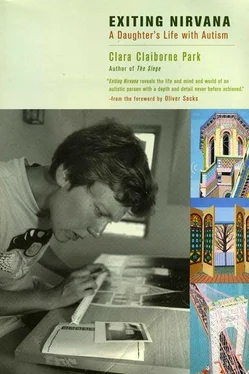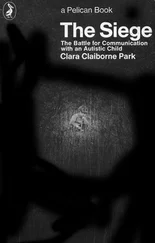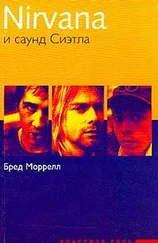Clara Park - Exiting Nirvana
Здесь есть возможность читать онлайн «Clara Park - Exiting Nirvana» весь текст электронной книги совершенно бесплатно (целиком полную версию без сокращений). В некоторых случаях можно слушать аудио, скачать через торрент в формате fb2 и присутствует краткое содержание. ISBN: , Жанр: Психология, на английском языке. Описание произведения, (предисловие) а так же отзывы посетителей доступны на портале библиотеки ЛибКат.
- Название:Exiting Nirvana
- Автор:
- Жанр:
- Год:неизвестен
- ISBN:0-316-69117-8
- Рейтинг книги:4 / 5. Голосов: 1
-
Избранное:Добавить в избранное
- Отзывы:
-
Ваша оценка:
- 80
- 1
- 2
- 3
- 4
- 5
Exiting Nirvana: краткое содержание, описание и аннотация
Предлагаем к чтению аннотацию, описание, краткое содержание или предисловие (зависит от того, что написал сам автор книги «Exiting Nirvana»). Если вы не нашли необходимую информацию о книге — напишите в комментариях, мы постараемся отыскать её.
All illustrations are by Jessy Park.
Exiting Nirvana — читать онлайн бесплатно полную книгу (весь текст) целиком
Ниже представлен текст книги, разбитый по страницам. Система сохранения места последней прочитанной страницы, позволяет с удобством читать онлайн бесплатно книгу «Exiting Nirvana», без необходимости каждый раз заново искать на чём Вы остановились. Поставьте закладку, и сможете в любой момент перейти на страницу, на которой закончили чтение.
Интервал:
Закладка:
Why eight? I ashed.
«Because of good».
?
I transcribe from my notes. Though it would make for a neater narrative, I won’t reinvent the words of the question I didn’t record. My question mark, floating in blankness, is a truer rendition.
«Because Ann cough and burp too. (Pause) And silence is 8.
And between silence and sound is 7».
How was Ann’s cough sounds and silence?
«Sounds and silence at the same time but not between».
If Ann talked at the same time would that be sound?
«Only politeness is sound».
She means «please», «you’re welcome», «thank you», «excuse me»; for years she’s been sensitive to these phrases, doesn’t want to hear them, doesn’t want to say them. Hypersensitive. And we don’t know why. It’s Strange. The categories bleed into each other, like watercolors on wet paper.
And ordinary talk?
«That is not sound. (Pause) And the bell in camp is a sound and also a silence, and a sound between silence».
The bleeding continues. The bell sounds three times, with intervals between — is that it? That bell was loud, but Jessy used to run upstairs from the soft click of the dishwasher, the low rumble when the thermostat tripped the furnace. Even today she covers her ears when she opens the refrigerator, in case the motor turns on. Auditory sensitivities are characteristic of autism. But the bacon-and-egg system, it’s clear, includes more than sound.
«Doing something fairly bad is only 3 and bad is 2 and very bad is 1!»
What if there’s a foghorn and doing something bad?
«That is 2. (Pause) Doing something bad is the most! No wonder get egg». (I begin to see; breakfast with only two pieces of bacon is incomplete and must be suitably supplemented.) «And you say a magic number is a sound too. And people scream out loud and shout and whistle is a sound too».
What is a magic number?
«8 is a magic number. 6, 4, 3, 5, 2, 1 is a magic number».
Not 7?
«And 7 too. (Pause) And all are, up to infinity. (Pause) If I have less than 6 and don’t have any bread have a small egg or some of these fruit instead of egg. Egg is only for less than 4».
Now she goes into a graded system of substitutions for decreasing amounts of bacon. My mind is spinning, I don’t catch it all. I revert to the numbers:
Are all the numbers equally magic or some more magic?
«1 to 8 is very magic. If I have less than 5 and egg I have to cut that thin slices of toast. If I have less than 5 and no egg I have to make thick slices of toast». And it goes on.
What envelope to put that in? A breakfast dialogue with a teenager; a plunge into the experience of autism.
It’s all there, in that single conversation. Idiosyncratic Language. Hypersensitivities. Compulsions. Correlations. Numbers. But perhaps most important is the simple Social fact: at fifteen, after so many years of effort — ours, her teachers’, her own — Jessy was really trying to communicate. Instead of ignoring my questions or fending them off with a convenient «I don’t know», she was working hard to answer them. She had something she wanted to explain enough to propel her through the effort of putting words together. It was a matter of absorbing interest to her. She wanted to share it with another person. How normal, how ordinary — for an ordinary toddler, the toddler she never was.
And who but its creator could explain such a system? Bad — an emotional, perhaps even a moral category (but though normal toddlers continually say «bad cat», «bad mama», I realize now that I’ve never heard Jessy apply «bad» to a living being). Badness ordered into degrees, logically, numerically correlated to exact quantities of bacon, bread, fruit, to determine a breakfast menu. Strangeness suffusing the everyday.
There is no single entrance into the enveloping experience of autism. Jessy’s strange systems, here glimpsed, require a chapter to themselves. I will not start with them, though more than anything else they reveal the way she thinks, its unique amalgam of simplicity and complex logic. Yet though language is not the core of Jessy s experience, it is only through language that her experience has — to some degree — become accessible to us. And it is only through language that our experience has become accessible to her — to some degree. So these opening chapters will focus on language, the gateway to a shared world.
I wrote the bacon-and-egg dialogue down as it happened, but it wasn’t until afterward that I realized how much was hidden within it. Jessy’s words had opened a window into the wordless long ago, lighting up what it was to be surrounded by sound, hearing it with preternatural sharpness, yet unable to give it human meaning. What counts as sound? As silence? Ordinary talk is not sound. Polite phrases are sounds — automatic, unchanging reflexes, almost meaningless. So are coughs and burps and bells and shouts and whistles. Jessy volunteered another example: «And animal noises just like a dog». (I remembered a midnight three years earlier, when Jessy screamed and screamed and wouldn’t sleep because a dog was barking a mile away.) Jessy had defined meaningful speech out of existence. Talk all around her — we are a talkative family — understanding none of it; sounds for her were exactly what for us were mere noises. Sounds were simple, recognizable, intelligible, reliable, the same at every hearing. Only these penetrated Nirvana — emissaries, mostly unwelcome, out of the enveloping incomprehensibility. And silence is 8. Because of good. Silence makes no demands.
Certainly it was no longer like that on October 7, 1973. Now she was talking to me, understanding my questions, trying to answer them. But that was the way it had been. It was out of that bewilderment she had emerged. Emerged? Indeed. But her words themselves expressed how qualified was that emergence. Years had passed, years of daily effort, as her family, her teachers, and she herself concentrated on every means we could think of to enable and encourage speech. Five years before, her labored, garbled words had been scarcely intelligible outside her own family. Now any patient listener might understand them. Yet again and again, to even the patient listener, the common words of our common tongue resisted common sense.
What was going on? Certainly Jessy’s reality was not ours. Speech that communicated strangeness must inevitably be strange. But there was more to it than that. The ears that registered the softest, remotest click seemed unable to distinguish the essential sounds that make one word what it is and not another. The mind that grasped squares and square roots as if by instinct couldn’t seem to get the hang of how her native language worked.
«I looked at the clock by mistake», she would say. Clearly it was important; Jessy would be shrieking, inconsolable by anything we could say or do. But «by mistake»? After years of bewilderment, one day it came to me: you can’t look at something by mistake. Looking is a deliberate act. But you can see something unexpectedly, and we’d long known how distressed Jessy was by the unexpected. Could that be what she meant? It was possible. Spoken, heard, both words contained the same hard «k» sound. I began to pay closer attention to those agonized «by mistakes», testing my guess before I tried out what she thought of my translation, since it is all too easy to secure agreement from an autistic person who only partially comprehends your question and wishes you would go away. Jessy accepted the new word — more, over time it supplanted the bizarre original, to the point where one day she could exclaim, «I saw a star unexpectedly, I’m so sad!» She was twenty-five then, her vocabulary growing steadily in range and sophistication. Yet polysyllabic or seldom-heard words were still heard inaccurately and reproduced only approximately, as with a small child. Thirteen years later we would hear her remark, referring to something that might have happened but didn’t, «I said it ex post facto». Surprised, we laughed. She laughed too, then added, «I didn’t mean ‘ex post fracto, ’ I meant ‘hypothetical.’» A confusion of sound? Of meaning? The natural result of habitual inattention to a still largely unintelligible surround? All three?
Читать дальшеИнтервал:
Закладка:
Похожие книги на «Exiting Nirvana»
Представляем Вашему вниманию похожие книги на «Exiting Nirvana» списком для выбора. Мы отобрали схожую по названию и смыслу литературу в надежде предоставить читателям больше вариантов отыскать новые, интересные, ещё непрочитанные произведения.
Обсуждение, отзывы о книге «Exiting Nirvana» и просто собственные мнения читателей. Оставьте ваши комментарии, напишите, что Вы думаете о произведении, его смысле или главных героях. Укажите что конкретно понравилось, а что нет, и почему Вы так считаете.



![Майкл Азеррад - Come as you are - история Nirvana, рассказанная Куртом Кобейном и записанная Майклом Азеррадом [litres]](/books/392533/majkl-azerrad-come-as-you-are-istoriya-nirvana-ra-thumb.webp)



![Эверетт Тру - Nirvana - Правдивая история [litres]](/books/399241/everett-tru-nirvana-pravdivaya-istoriya-litres-thumb.webp)




